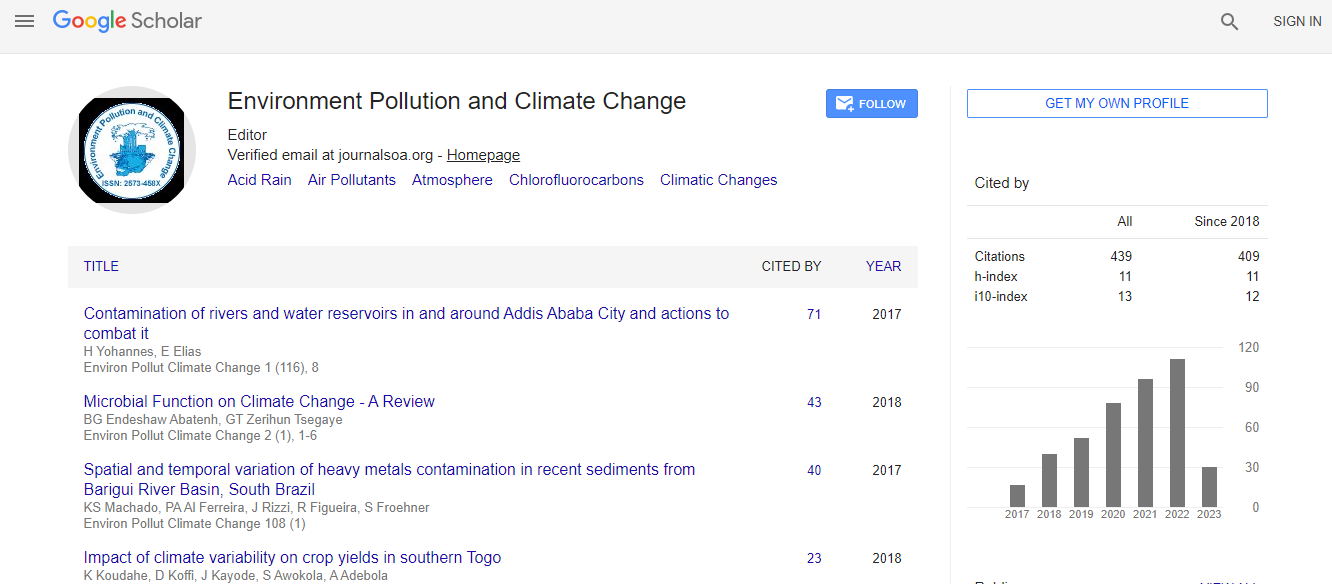Our Group organises 3000+ Global Conferenceseries Events every year across USA, Europe & Asia with support from 1000 more scientific Societies and Publishes 700+ Open Access Journals which contains over 50000 eminent personalities, reputed scientists as editorial board members.
Open Access Journals gaining more Readers and Citations
700 Journals and 15,000,000 Readers Each Journal is getting 25,000+ Readers
Google Scholar citation report
Citations : 672
Environment Pollution and Climate Change received 672 citations as per Google Scholar report
Environment Pollution and Climate Change peer review process verified at publons
Indexed In
- Google Scholar
- Publons
- Euro Pub
- ICMJE
Useful Links
Recommended Journals
Share This Page
Hydrologic and climatic responses to global anthropogenic groundwater extraction
Joint Event on 5th World Conference on Climate Change & 16th Annual Meeting on Environmental Toxicology and Biological Systems
Zhenghui Xie, Liu S, Zeng Y, Gao J, Qin P, Jia B, Xie J, Liu B, Li R, Wang Y and Wang L
Chinese Academy of Sciences, China
ScientificTracks Abstracts: Environ Pollut Climate Change
Abstract
Anthropogenic groundwater exploitation essentially changes soil moisture, land-atmosphere water and energy fluxes, even climate system. In over-exploited regions, the terrestrial water storage has been rapidly depleted, causing water unsustainability and climate change. Quantifying the hydrologic and climatic responses to anthropogenic groundwater extraction not only advances our understanding on the hydrological cycle with human intervention, but also benefits effective human water management. In this paper, the authors incorporated a scheme of anthropogenic groundwater exploitation into the Community Earth System Model 1.2.0, and conducted a series of simulations over globe to investigate the effects of groundwater exploitation on the hydrological processes and climate system around the world. The framework of the coupled model are shown in Fig. 1. The model was also applied over Heihe River Basin in northwestern China for investigating the impacts of water use and groundwater lateral flow on basin-scale land processes, and the eco-hydrological effects of streamaquifer water interaction over riverbanks. Results show that groundwater exploitation caused drying in deep soil layers but wetting in upper layers, with a rapidly declining water table in areas with the most severe groundwater extraction, including the central United States, North China Plains and the north India and Pakistan. The atmosphere also responded to groundwater extraction, with cooling at the 850 hPa level over the north India and Pakistan and a large area in North China and central Russia. Increased precipitation occurred in North China Plains. Decreased precipitation occurred in north India because the Indian monsoon and its transport of water vapor were weaker as a result of cooling induced by groundwater use. Local terrestrial water storage was unsustainable at the current high extraction rate. Thus, a balance between reduced water withdrawal and rapid economic development must be achieved to maintain a sustainable water resource, especially in over-exploited regions. Recent Publications 1. Xie Z, Liu S, Zeng Y, Gao J, Qin P, et al. (2018) A high-resolution land model with groundwater lateral flow, water use and soil freeze-thaw front dynamics and its applications in an endorheic basin. Journal of Geophysical Research-Atmospheres 123. 2. Zeng Y, Xie Z and Zou J (2016) Hydrologic and climatic responses to global anthropogenic groundwater extraction. Journal of Climate 30:71–90. 3. Zeng Y, Xie Z, Yu Y, Liu S, Wang L, et al. (2016) Effects of anthropogenic water regulation and groundwater lateral flow on land processes. Journal of Advances in Modeling Earth System 8:1106–1131. 4. Zeng Y, Xie Z, Yu Y, Liu S, Wang L, et al. (2016) Ecohydrological effects of stream– aquifer water interaction: a case study of the Heihe River basin, northwestern China. Hydrology and Earth System Sciences 20:2333–2352.Biography
Zhenghui Xie, Professor/Dr., State Key Laboratory of Numerical Modelling for Atmospheric Sciences and Geophysical Fluid Dynamics, Institute of Atmospheric Physics, Chinese Academy of Sciences, Deputy Director of. He got Ph.D. from Institute of Computational Mathematics, Chinese Academy of Sciences in 1996, and master degree from Hunan University in 1988. He visited Civil and Environmental Engineering, University of California at Berkeley, USA, and University of Tennessee at Knoxville, USA as visiting Assistant Professor during 1998-2001,. He is working on the development of a land surface model in the climate system and its applications, land surface models and their coupling with regional and general climate models, macro-scale land hydrological models and their parameter calibrations and transfers, interactions between climate and vegetation, land data assimilation and its applications, and computational mathematics and geophysical fluid dynamics. http://web.lasg.ac.cn/staff/xie/xie.htm
E-mail: zxie@lasg.iap.ac.cn

 Spanish
Spanish  Chinese
Chinese  Russian
Russian  German
German  French
French  Japanese
Japanese  Portuguese
Portuguese  Hindi
Hindi 
